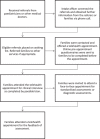Telehealth in a paediatric developmental metropolitan assessment clinic: Perspectives and experiences of families and clinicians
- PMID: 35978461
- PMCID: PMC9615062
- DOI: 10.1111/hex.13582
Telehealth in a paediatric developmental metropolitan assessment clinic: Perspectives and experiences of families and clinicians
Abstract
Background: The application of telehealth in the paediatric setting is growing, and yet, limited research has focused on using telehealth in developmental diagnostic assessment and the consumers' perceptions of their telehealth experience. This study explored parents'/carers' and staff experiences of using telehealth as part of the developmental diagnostic assessment.
Methods: Parents/carers who attended an assessment between June 2020 and July 2021 that incorporated a telehealth component within a hybrid service delivery model were invited to provide feedback about their experience of telehealth appointments at a multidisciplinary developmental assessment service. All parents were invited to complete an online survey, with a sample of families being offered a telephone interview. Staff members were invited to a focus group to explore their experiences of delivering services via telehealth. Data obtained were analysed descriptively and thematically using a mixed method of analysis. Codes were categorized, enabling facilitators and barriers to be explored.
Results: The use of telehealth in the diagnostic assessment of complex developmental disorders received high levels of acceptance from parents/carers and staff, despite having limitations such as technical issues, difficulties building rapport between families/clinicians and limited direct observations of the child. Telehealth services are perceived to reduce costs and increase flexibility, including increased ability to accommodate family needs.
Conclusions: Results demonstrated that telehealth is a highly acceptable mode of service in a developmental assessment service. The current study informs the development of a hybrid service delivery model by enhancing facilitators and reducing barriers commonly reported by consumers and provides direction for future research.
Patient or public contribution: Parents or carers of children who attended a tertiary paediatric assessment unit for a diagnostic developmental assessment completed the online survey and were interviewed.
Keywords: developmental disorders; diagnosis; paediatric service; telehealth assessment.
© 2022 The Authors. Health Expectations published by John Wiley & Sons Ltd.
Conflict of interest statement
The authors, Marie Antoinette Hodge, Suzi Drevensek, Marcia Williamsz and Natalie Silove, were involved in the staff focus group as participants.
Figures
References
MeSH terms
LinkOut - more resources
Full Text Sources
Medical




